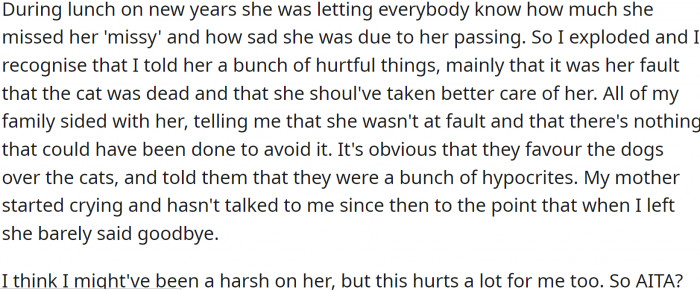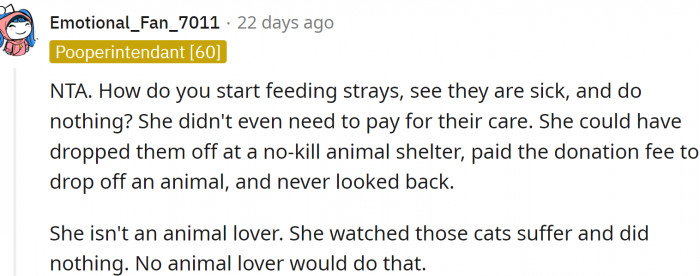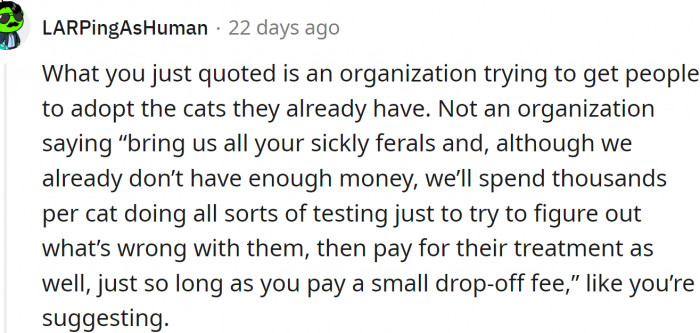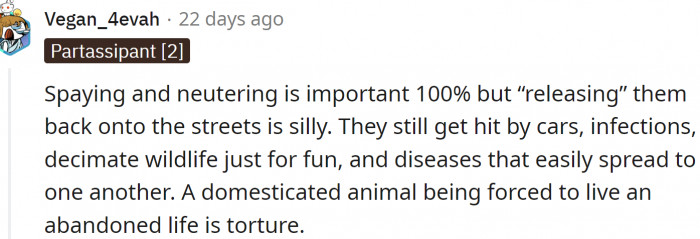Redditor Tells Mom the Harsh Truth About How Lack of Care Killed Her Cats, Gets Criticized by Rest of Family
Having cats brings with it a lot of responsibility. Cats need to be provided with food, shelter, and companionship regularly.
They need to be taken to the vet for regular checkups, vaccinations, deworming, and treatments for any medical issues. They must also be groomed, and their nails trimmed.
In addition, cats must be spayed or neutered to prevent overpopulation and kept safe from potential hazards such as toxic plants, electrical cords, and sharp objects. We have a story today that perfectly demonstrates what a lack of responsibility can cause.
OP is frustrated with her mother's lack of responsibility for the cats she was taking care of. Her mother is a self-proclaimed 'animal lover' and owns two dogs and many chickens, but her cats were not given the same care.
A stray cat arrived at her house a few years back, followed by a litter of kittens, and soon they were all living in her backyard. Despite the fact that her mother had the money, she refused to take the cats to the vet, and as a result, only two survived.
OP visited twice a year and tried to persuade her mother to give the cats away if she wasn't going to take better care of them, but her mother's excuses were unsatisfactory. Finally, OP became fed up with her mother's attitude, and when she heard that the only remaining cat had died, she exploded and told her mother that it was her fault for not taking better care of the cat.
Unfortunately, OP's family sided with her mother, which caused her to become emotional. OP has since been questioning whether she was too harsh and is hurt by the situation.
OP asks:

Her mother is a self-proclaimed 'animal lover' and owns two dogs and many chickens, but her cats were not given the same care.

OP is frustrated with her mother's lack of responsibility for the cats she was taking care of.

The Emotional Impact of Inaction
When pets are involved, the emotional stakes can be particularly high. Research published in the Journal of Veterinary Behavior indicates that emotional attachment to pets can lead to significant distress when their well-being is compromised.
In this case, OP's feelings about the cats reflect a deep concern for their welfare, which can be exacerbated by the perceived indifference of family members.
She owns two dogs and many chickens, but her cats were not given the same care.

Despite the fact that her mother had the money, she refused to take the cats to the vet, and as a result, only two survived.

Finally, OP became fed up with her mother's attitude, and when she heard that the only remaining cat had died, she exploded and told her mother that it was her fault for not taking better care of the cat.

This scenario highlights how family dynamics can complicate caregiving responsibilities. Psychological studies suggest that favoritism in families often leads to feelings of resentment and conflict, particularly when one member feels their concerns are dismissed.
These dynamics can create a hostile environment, making it difficult to address issues constructively.
Now she wonders:

"She isn't an animal lover."

This is the sad truth:

The Importance of Advocacy in Caregiving
Advocating for the needs of vulnerable individuals, including pets, is a critical aspect of caregiving. Research from the American Journal of Psychology suggests that caregivers who actively advocate for those in their care report higher levels of satisfaction and emotional well-being.
In this case, OP's push for better treatment of the cats aligns with this finding, demonstrating the emotional investment involved in caregiving.
Redditor says:

Again, the sad truth:

Sounds suspicious:

To address these family tensions, it might be helpful for OP to engage in a dialogue with family members about the importance of equal treatment for all pets. This could involve discussing feelings about the cats and highlighting the need for a balanced approach to care.
Research shows that when caregivers communicate their feelings about the importance of fair treatment, it can lead to improved family dynamics and support for caregiving efforts.
"A domesticated animal being forced to live an abandoned life is torture."

All cats need homes.

Having cats can be a lot of work, but it is very rewarding. Cats can provide unconditional love, companionship, and plenty of entertainment.
With the right care and attention, cats can be wonderful, loving pets. However, there is work required on your part.
Namely, you have to take good care of them if you want them to love you back. Of course, they need to be alive to do it.
Psychological Analysis
This situation reflects common challenges within families regarding caregiving responsibilities. OP's concerns for the cats highlight the importance of equitable treatment among pets, and it's crucial for family members to engage in open discussions to address these issues.
Analysis generated by AI
Analysis & Alternative Approaches
In summary, the emotional complexities of caregiving for pets can significantly affect family dynamics. By advocating for the needs of all animals in the household and fostering open communication, family members can create a more harmonious environment.
As noted by the American Psychological Association, understanding the emotional implications of caregiving is essential for promoting healthier family interactions and emotional well-being.



